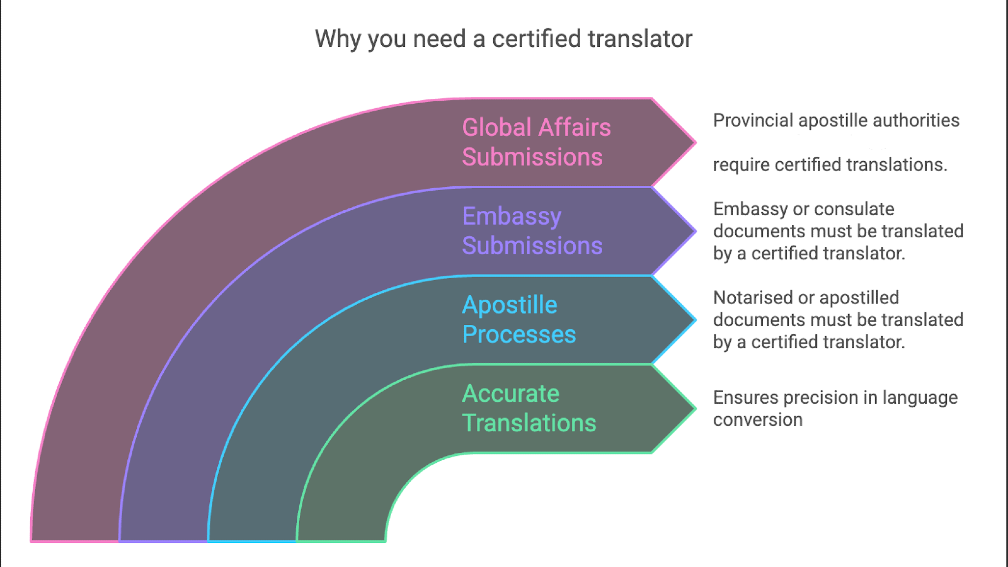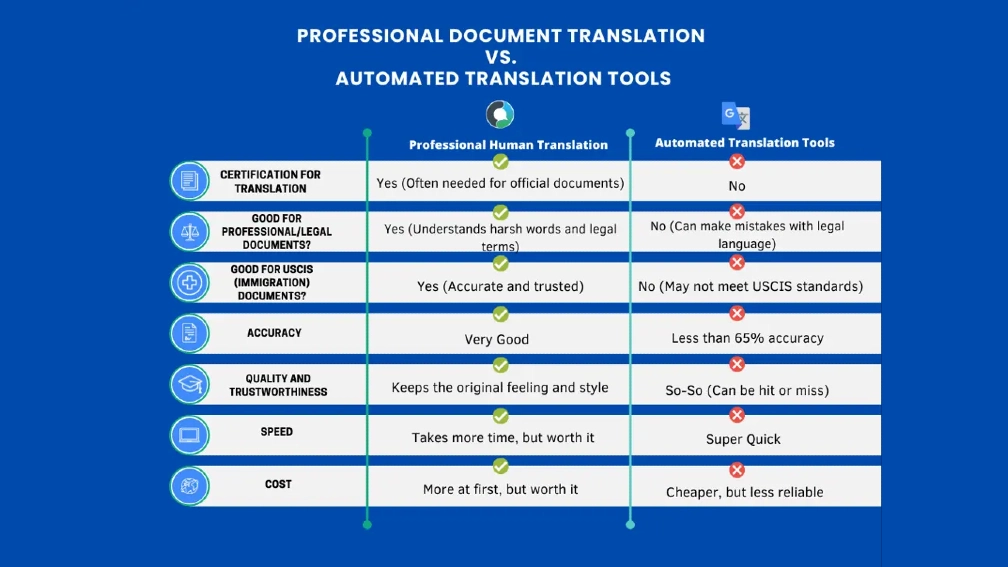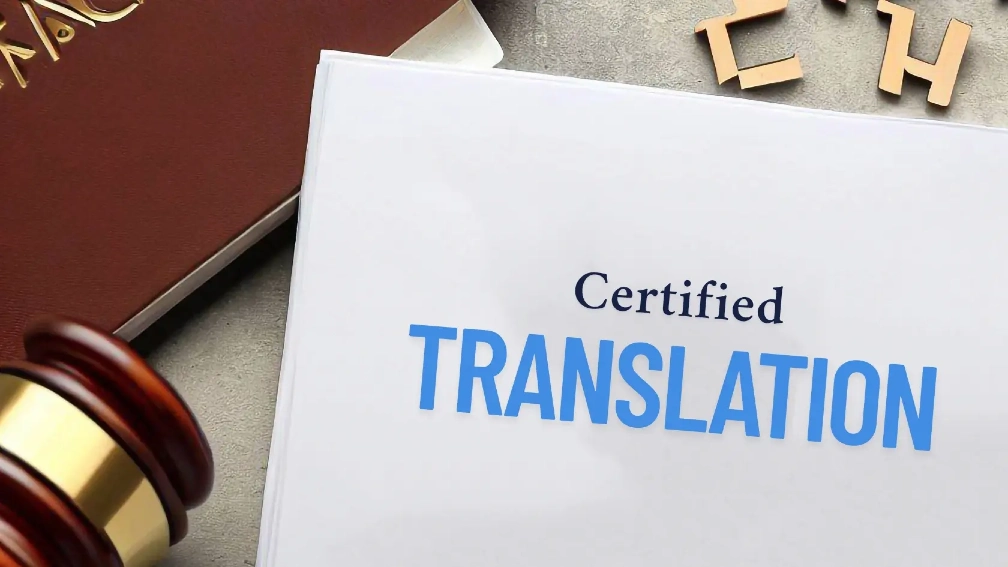Translating books or letters is one thing, but translating certified official documents is something else. Marriage certificates, birth records, or other documents require precise translation, without a single mistake or improvisation. This is the only way to get an apostille and be legal documents that are used abroad.
Certified translations are the first step towards meeting the strict rules of the Hague Apostille Convention, which is the body that created and legalised the apostille as a form of acknowledging the legality of translated documents.

Why Are Certified Translations Needed in the Apostille Process?
Getting an apostille is not as straightforward as we might want it to be. It’s a process with rules that must be obliged, or else you’re not getting the required documents. The backbone of the process is the translation of the document you need an apostille for. However, those obligated to provide one must be sure the translation is authentic.
The only way to do it is to provide a certified translation. These are translators who are recognised as professional and trusted. When you need an apostille, the only way to get it is by hiring a certified translator who will ensure your documents are authentically translated.
Certified vs. Non-Certified Translations
There’s a temptation to think any translation will do. After all, if the words make sense, why should it matter? But the difference between a certified translation and a standard translation is night and day. Certified translations are signed and stamped, anchored in accountability, while non-certified translations float without legal weight.
Apostille services can spot the difference instantly. For anyone hoping to obtain an apostille for international use, only certified translations stand up to scrutiny. The rest may read well but they carry no guarantee.
Why Uncertified Translations are Often Rejected?
Uncertified translations are easy to dismiss because there’s no way to know who produced them, or whether the translation is accurate. Immigration offices, courts, and even universities abroad have seen too many “translations” done by friends, colleagues, or worse – machine software.
Without certification, there is no proof, no chain of responsibility, and no guarantee the document is authentic. That’s why uncertified translations are often rejected outright, leaving you to start again, sometimes at the worst possible moment.
| Feature | Certified Translation | Non-Certified Translation |
|---|---|---|
| Verification | Signed & stamped by translator/agency | No official verification |
| Acceptance Abroad | Universally recognized | Often rejected |
| Cost | Higher | Lower |
| Use Cases | Apostilles, legal documents, immigration | Personal/internal use |
When Do You Need a Certified Translation Before Apostille?
You will need a certified translation for most documents you want to use in another country. Documents like birth or death certificates, diplomas, or transcripts will all require certified translations. Without one, the UK apostille service you go to won’t accept the documents and won’t give you an apostille. The officially translated document is crucial for getting an apostille.
- Birth, marriage, death certificates
- Educational diplomas and transcripts
- Power of attorney, contracts, corporate records
- Country-specific
Different countries have different levels of strictness. Spain and Italy, for instance, rarely accept anything less than sworn translations for legal and court-related matters. In Latvia, you’ll need a sworn translation in Latvia before you can even obtain an apostille certificate. These rules aren’t designed to frustrate you; they exist to protect the integrity of official records. But it does mean you need to know what’s required before you send your documents abroad. A reputable service provider like Locate Translate understands these differences and helps you avoid legal translation mistakes that cost both time and money.

The Risks of Skipping Certified Translation
Skipping certified translation feels like a shortcut until it unravels. Maybe you save a little money upfront, but when the foreign authority refuses your papers, you’re forced to start over. By then you’ve lost more than cash – you may have missed a deadline for a visa, a court hearing, or a job application.
Apostilled documents are meant to travel without fuss, but only when they are translated and certified correctly. Think of certified translations as the insurance that guarantees your documents won’t be thrown back at you when you need them most.
How to Get a Certified Translation for Apostille Documents?
To do this, you must first find a professional translation agency and ask if they can provide a certified translation of the type of document you need and in the language you will be using it for. The next step is to send the documents and wait for the translations. When this is done, you can submit the original documents along with the certificate from the translation company to the apostille issuing agency and ask for one that you will use where it is needed.
FAQs
Is a sworn translation the same as a certified translation?
Not really. Better said, not in the UK, but in other countries, like Spain or Latvia, a sworn translation is enough. However, if you’re talking about a translation in the UK, you will need a certified translation, and only in this way can you have certified legal documents that you can further use.
Do I need to apostille the translation itself, or just the original document?
In most cases, you will need to get both. When you’re going into another country and you need these documents, you don’t know which one is more important, so getting an apostille on both is the best way to do it. All countries have different rules and regulations, and you must be prepared for different practices than what you’re used to at home.
Can I use machine translation (like Google Translate) if I certify it myself?
Of course, not. Although machine-generated translations might be accurate, they can not be trusted 100% of the time. Only a professional and certified translator is to be trusted in this case. Aside from the certainty, no apostille service will accept anything less than professional work.
Which countries are the strictest about requiring certified translations with apostilles?
Countries such as Spain, Italy, France, and Latvia are among the strictest, often demanding sworn translation services in addition to certified translations. To guarantee that your documents are accepted abroad, you should work with a professional translation agency experienced in apostille translation services.




